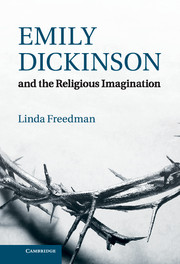Chapter 1 - A Word made flesh
Published online by Cambridge University Press: 07 September 2011
Summary
The Word made flesh is the basis of the Gospel story. The incarnation implies the narrative of Christ’s life, making it both a story for all time, the capitalised and absolute Word carrying the meaning of revelation in the body of Christ, and a tale that draws attention to the human and transitory conditions of existence. In Dickinson’s poetry, the paradox of the Word made flesh underpins a tension between religious revelation and aesthetic representation. This chapter probes that tension and argues that this is the context from which Dickinson’s poetic concern with embodiment derives its distinctive qualities. Dickinson was not only heir to a literary and theological tradition that merged the discourses of representation and revelation, she was also writing in a culture which had a particular interest in the body as a signifier of incorporeal meaning and in the duality of poetic consciousness. In Dickinson’s poetry these problems are referred back to their theological origins in incarnation doctrine.
From revelation to representation
In Puritan New England, the Word made flesh was the prime example of divine–human communication. In 1633 the English Puritan William Guild wrote: ‘the Messiah … was the resemblance, painting and pointing out that cleere Lampe and Lambe of God, the express Image and ingraven Character of the Father’. Guild expresses a Calvinist preoccupation with the revelation of God in Christ. He makes no reference to Jesus’s humanity so as to close the gap between Father and Son, the thing-in-itself and the image of the thing. However, he cannot avoid the language of imperfection: ‘resemblance, painting … Image and ingraven Character’. Despite Guild’s implicit desire for it to be otherwise, God remains partly hidden, not fully revealed even in his own revelation. Calvinist orthodoxy required such a space between spirit and natural man. Divine revelation, even in the body of Christ, was of necessity imperfect. The gap between the thing-in-itself and the image of the thing, or the divine referent and its representational sign, could not be closed.
- Type
- Chapter
- Information
- Emily Dickinson and the Religious Imagination , pp. 16 - 49Publisher: Cambridge University PressPrint publication year: 2011



